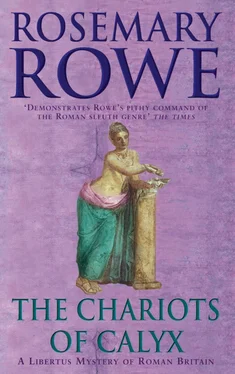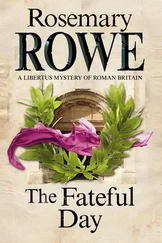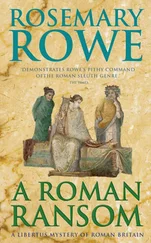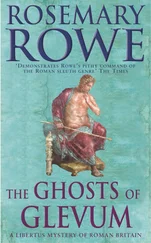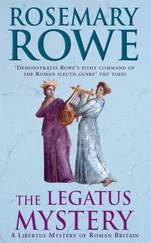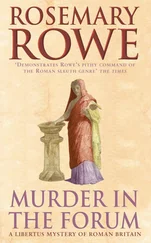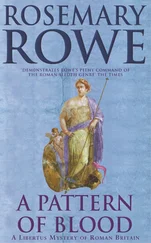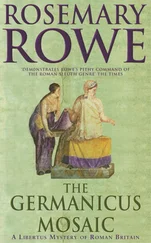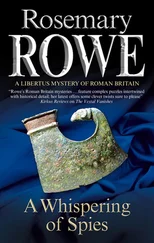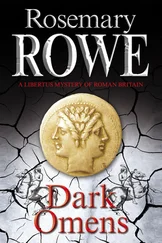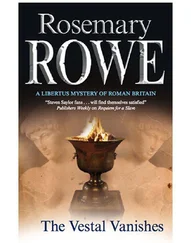Rosemary Rowe - The Chariots of Calyx
Здесь есть возможность читать онлайн «Rosemary Rowe - The Chariots of Calyx» весь текст электронной книги совершенно бесплатно (целиком полную версию без сокращений). В некоторых случаях можно слушать аудио, скачать через торрент в формате fb2 и присутствует краткое содержание. Год выпуска: 2002, ISBN: 2002, Издательство: Headline, Жанр: Исторический детектив, на английском языке. Описание произведения, (предисловие) а так же отзывы посетителей доступны на портале библиотеки ЛибКат.
- Название:The Chariots of Calyx
- Автор:
- Издательство:Headline
- Жанр:
- Год:2002
- ISBN:9781472205087
- Рейтинг книги:5 / 5. Голосов: 1
-
Избранное:Добавить в избранное
- Отзывы:
-
Ваша оценка:
- 100
- 1
- 2
- 3
- 4
- 5
The Chariots of Calyx: краткое содержание, описание и аннотация
Предлагаем к чтению аннотацию, описание, краткое содержание или предисловие (зависит от того, что написал сам автор книги «The Chariots of Calyx»). Если вы не нашли необходимую информацию о книге — напишите в комментариях, мы постараемся отыскать её.
The Chariots of Calyx — читать онлайн бесплатно полную книгу (весь текст) целиком
Ниже представлен текст книги, разбитый по страницам. Система сохранения места последней прочитанной страницы, позволяет с удобством читать онлайн бесплатно книгу «The Chariots of Calyx», без необходимости каждый раз заново искать на чём Вы остановились. Поставьте закладку, и сможете в любой момент перейти на страницу, на которой закончили чтение.
Интервал:
Закладка:
‘I see!’ She smiled wryly. ‘You must think me very brave, citizen, to have permitted that. Suppose that he had lost his nerve, or stabbed me in the wrong place in the dark? None the less, I salute you. An ingenious explanation. But not true. Fortunatus did not kill my husband, citizen. Not even without my assistance — and certainly I did not help him or anyone else. Whoever killed Monnius, it cannot have been him.’
I raised my brows at her. ‘You are very certain of that.’
‘I am more than certain. It was a Roman feast-day yesterday, and there is a great five-day chariot-racing spectacular at Verulamium, in honour of the occasion. That is why Fortunatus did not attend my husband’s banquet, as he often does. He was in Verulamium, driving for his colour.’
‘In Verulamium?’ I said, stupidly.
‘All the Londinium factiones have gone there — one of the town authorities struck a bargain with the managers for the Londinium teams to come and race for their colours. He was promising huge sums in prize money besides. Do not look at me so doubtfully, citizen. There must have been a thousand witnesses — the last time Fortunatus appeared in Verulamium there was not a free seat in the stadium and people in the street outside were still fighting to get in.’
I sighed. The neat little mosaic of a theory I had carefully constructed had just shattered into a hundred pieces. If Fortunatus was racing in Verulamium, he could not have killed the frumentarius .
I know a little bit about chariot racing — it is thought of as a Roman institution, of course, but we were racing warcarts on this island before Julius Caesar ever set foot here, and, like every other Celt, I attend whenever my business makes it possible. Of course the races in Glevum are not professional affairs as they are in Londinium — the drivers there are simply members of the college of youth, and the track is a makeshift affair with wooden stakes hammered in to mark the turning points — but the racing itself is no less exciting for that.
Of course it would be a little different in Verulamium. It is a large town — it was once the capital of the local tribes — but I doubted that it had a purpose-built stadium either. No doubt sponsoring a real spectacle, with professionals coming all the way from Londinium, was someone’s way of impressing the populace and winning support for public office. Wealthy patrons of the factiones in every town do the same thing — queuing up for the honour of offering financial support to the colour of their choice, and even sometimes bringing teams from overseas. Presumably it works — entrance to these things is traditionally free, and there are always passionate crowds at even the smallest races.
In Verulamium probably half the town would have turned out, as Fulvia said. I could imagine it: scuffles for seats and fist-fights for the best vantage points in the standing spaces, while the visiting charioteers — with their whole retinue of stable boys, managers, guards and medical attendants — became the idols of the entire community, followed and cheered at wherever they went.
So how could Fortunatus simply have disappeared for the night? It was impossible. He would have been guarded to the hilt for one thing — people stake whole fortunes on the outcome of a chariot race, and there have been too many attempts in recent years to interfere with drivers and horses. Even in Glevum last year we had someone trying to dope the favourite, and stick a dagger between the driver’s ribs. Fortunatus, the most famous charioteer of all, could no more have slipped off for an evening unobserved than the Emperor could have done so himself.
Besides, Verulamium is several hours away even on a good horse in broad daylight. Not even Fortunatus could possibly have raced all day — and it would have been all day, the organisers like to get value for their money — galloped to Londinium in the dark to strangle Monnius and then popped back to Verulamium again in time to start all over first thing in the morning.
So if it was not Fortunatus, who was it? He could have paid someone else to do it, of course — and invited blackmail for the rest of his days. The charioteer was a rich man and the penalties for conspiracy were fearful.
‘In any case,’ Fulvia was saying, breaking into my thoughts, ‘I saw the man. The figure I saw at my bedside was taller and broader than Fortunatus. I assure you, citizen, I would have recognised him .’ She gave me one of those sideways looks again, and sighed. She was delectable. No wonder they nicknamed the charioteer ‘fortunatus’.
A renewed waft of smoke and incense from the next room reminded me of my duty. The undertakers had clearly lit the remaining candles. I said, ‘Then I must thank you, lady, for your help, and apologise for having taken up your time. You must be anxious to prepare the lament.’ To make the ritual washing of her hands and put the ashes on her head, I meant, but the words sounded unintentionally ironic.
She looked at me gravely. ‘I will lament my husband, citizen, and sincerely too. Monnius was an uncouth bedfellow — I will not pretend otherwise — but he was good to me in his way. If he was suspicious about Fortunatus — and I’m sure his mother saw to that! — he was content to ignore it, provided that I was discreet in public and never showed a lack of compliance when he came to me. In fact, I think the notion sometimes excited him.’
I was on the point of leaving, but that stopped me. I tried to imagine feeling ‘excited’, when I was young, had someone made advances to my beloved wife. I failed. I forced the thought aside, and said, ‘How so?’
She laughed, gaily. ‘Fortunatus is young, rich, strong and famous. He could have any woman he wanted — and he wanted me. I think that made me seem more desirable to my husband.’
‘Because you belonged to him?’ I said slowly. It might be true. Jealousy, and a frenzied imagination, can lead to a kind of furious possession. Most Roman men would have their wives executed, or at least divorced and exiled to some barren island, if even a hint of infidelity had attached to them. Yet as Annia herself had told me, Monnius had brushed aside all his mother’s warnings, and become even more fiercely besotted with his wife. And, I reminded myself, he permitted his first wife to live in the annexe.
‘Exactly, citizen. You understand me, I think.’ She smiled at me again, stirring a little on the bed and showing those uneven teeth. The effect was oddly provocative — like her words. No wonder Monnius and Fortunatus had fallen captive to her charms. I glanced uneasily at the two pageboys, but they just went on wafting the smoke away from under the door, their faces blank as stone.
‘Well, I will leave you, lady,’ I said again. ‘If Fortunatus did not kill your husband, then I must discover who did. And who it was who drugged the slaves last night. If it was not you yourself?’
She laughed. ‘I assure you, citizen, my expertise with herbs does not extend so far. A simple remedy for croup I might manage, or an ointment for bruising, but not a potent sleeping draught! I would never be certain it would work. Indeed, when I want one for my own use — on those occasions which Prisca was telling you of — I have Lydia make me one.’
‘Lydia?’ Monnius’ former wife had not impressed me as a woman of many talents.
‘Oh, indeed, citizen. It is one of the womanly skills in which Annia Augusta continues to encourage her — one of the wifely virtues in which she outdoes me. Annia has taught her everything she knows — only, of course, I could scarcely ask Annia herself. You can imagine what she would say if I requested a sleeping draught.’
I could imagine. ‘And did you ever use one on your husband? To ensure that he slept when Fortunatus came?’ If Monnius had been drugged the night before, I thought, it would explain much about the manner of his death.
Читать дальшеИнтервал:
Закладка:
Похожие книги на «The Chariots of Calyx»
Представляем Вашему вниманию похожие книги на «The Chariots of Calyx» списком для выбора. Мы отобрали схожую по названию и смыслу литературу в надежде предоставить читателям больше вариантов отыскать новые, интересные, ещё непрочитанные произведения.
Обсуждение, отзывы о книге «The Chariots of Calyx» и просто собственные мнения читателей. Оставьте ваши комментарии, напишите, что Вы думаете о произведении, его смысле или главных героях. Укажите что конкретно понравилось, а что нет, и почему Вы так считаете.
